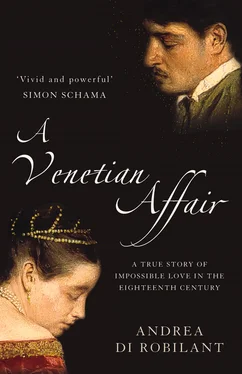However detestable her unyielding attitude must have seemed to the two lovers, it was certainly justified in the eyes of the English community. Consul Smith was fond of both Andrea and Giustiniana, but he was a practical man. When Andrea confided in him he sympathized with the lovers to a point. Nonetheless, he was very much on Mrs. Anna’s side. The few Venetian families with whom the Wynnes socialized also supported her—especially the powerful Morosinis, with whom the Memmos had a long-running political feud and whom Andrea detested. But her chief ally, as opposed as they were in character and inclination, was Andrea’s mother. Lucia saw, perhaps more clearly than the rest of the Memmos, the material disadvantages that a union with Giustiniana would bring to an old house which needed to reinvigorate its weak finances. And she feared the political damage the Memmos would suffer if her eldest and most promising son ever betrayed the family and crossed the inquisitors by marrying a woman beneath his rank.
The difference between the two mothers was that Lucia simply wanted to make sure Andrea did not get it into his head to marry Giustiniana. If in the meantime he dallied with her, as young men often did before settling down, it was no great worry to her and would not damage his future prospects. Mrs. Anna, on the other hand, was fighting a daily battle to prevent any contact between the lovers that might taint the family’s reputation and jeopardize her daughter’s chances of a respectable marriage.
Mrs. Anna was losing the battle. Andrea’s courtship was assiduous, visible to everyone, and highly compromising. He saw Giustiniana every day at the Listone in Piazza San Marco, where Venetians gathered for their evening stroll, and often later on as well, at one of the theaters. He frequently moored his gondola to the narrow dock below the Wynnes’ house and called on Giustiniana in full view of the family. In the winter of 1754 Mrs. Anna finally confronted him. She caused a terrible scene, declaring Andrea persona non grata in their house and making it clear she never wanted to see them together again. All communication was forbidden: letters, messages, the merest glance. It had to finish, she yelled—and sent him on his way.
News of Mrs. Anna’s dramatic stand traveled quickly around town. Andrea referred to the scene as his cacciata funesta 22 —his fateful banishment, and the starting point of all their misery.
Mrs. Anna was a fierce watchdog, always on the alert and obsessively suspicious. She kept a close eye on her eldest daughter and did not let her go out without a chaperon—usually herself. Her spies were planted wherever the lovers might seek to escape her gaze, both within the English set and among Venetian families, and she kept her ears constantly pricked for gossip about the lovers. Venice was a small world. Everyone knew who was losing his fortune at the Ridotto on a particular night and who was having an affair with whom. Andrea and Giustiniana were aware of the risk they were taking in defying Mrs. Anna’s ban; they had to be extremely careful about whom they spoke to and what they said. At a deeper level, they knew the future offered little promise of an end to their difficulties. But it was too soon, and they were too young, to worry about the future. For all the trouble their love had already caused, only one thing mattered to them in the winter and spring of that year: exploiting every opportunity to be together.
Just as Mrs. Anna resorted to the Venetian arts of intelligence, Andrea set up a small network of informers to obtain daily information about Giustiniana’s movements. His chief spy was Alvisetto, a young servant in the Wynne household, who was not always dependable because his fear of Mrs. Anna was sometimes stronger than his loyalty to his secret paymaster. He had the unfortunate habit of disappearing during his missions, leaving Andrea flustered and clueless on a street corner or at the side of a bridge. “Alvisetto did not make it to our appointment and I went looking for him all morning in vain,” he complained. “Poor us, Giustiniana. Sometimes I lose all hope when I think in whose hands we have put ourselves.”
Alvisetto was also the chief messenger, and he shuttled back and forth between Andrea and Giustiniana with letters and love notes. Occasionally, the gondoliers of Ca’ Memmo would moor at a dock near the Wynnes’ to drop off or pick up an envelope. If Mrs. Anna was at home, the two lovers would fall back on “the usual bottega for deliveries,” a general store around the corner from Giustiniana’s home, run by a friendly shopkeeper. When Andrea’s message could not wait—or if the urge to see her was irrepressible—he would appear at the window of Ca’ Tiepolo, the imposing palazzo across a narrow waterway from the Wynnes’ more modest house.
Ca’ Tiepolo belonged to one of the oldest and grandest Venetian families. Its wide neoclassical façade stood majestically on the Grand Canal. From the side window of the mezzanine it was possible to look directly across to the Wynnes’ balcony. The ties between the Tiepolos and the Memmos went back many centuries. Andrea was a good friend of the young Tiepolos and especially close to Domenico, better known by his nickname Meneghetto, who was among the few to know from the start that Andrea’s love affair with Giustiniana was continuing in secret. Meneghetto was happy to help, and Andrea often dropped by after sending Giustiniana precise instructions. “After lunch,” he advised her in one note, “find an excuse to come out on the balcony. But for heaven’s sake be careful about your mother. And don’t force me to edge out as far as the windowsill because she will certainly see me.”
Andrea’s portable telescope was very useful. He would point it in the direction of Giustiniana’s balcony from a campiello , a little square, across the Grand Canal, to check whether she was at home or to find out whether she might be getting ready to go out or, best of all, to watch her as she leaned lazily over the balcony, her hair wrapped in a bonnet, watching the boats go by. When he observed her from such a distance—about a hundred yards—Giustiniana was not always aware Andrea was spying on her. “Today I admired you with my canocchiale [telescope],” he announced to her mischievously. “I don’t really care if your mother saw me…. After all, the rules merely state that I cannot come into your house and that I cannot write to you.”
From a purely technical point of view he was also within bounds when, thanks again to the benevolence—and the sweat—of his gondoliers, he came down the Grand Canal and signaled to Giustiniana from the water. On days when she was confined to the house and they had no other way of seeing each other, Andrea’s sudden appearance at her neighbor’s window or the familiar plashing of the Memmo gondola down below was a welcome consolation. “Come by the canal as my mother doesn’t want me to go out,” she would plead. “And make an appearance at Ca’ Tiepolo as well, if you can.”
They developed their own sign language so they could communicate from a distance during the evening walk at the Listone or at the theater or, later in the night, at the gambling house. “Touch your hair if you’re going to the Ridotto,” he instructed her. “Nod or shake your head to tell me whether you plan to go to the piazza.” These little signals sometimes caused confusion if they were not worked out in advance. They also had to be given very discreetly, lest they set off Mrs. Anna’s alarm bells. “When you left the theater,” Andrea wrote anxiously, “you signaled something to me just as your mother turned around, and I think she might have noticed that. If this were the case it could damage us, since she might also have noticed all the other gestures we had made to each other from our boxes.” Despite his occasional burst of bravado, Andrea remained deeply worried not just by what Mrs. Anna might have seen but also by what she thought she might have seen. He went to such extremes to avoid creating false impressions that he sometimes sounded like an obstinate stage manager. “You must realize that if your mother catches you laughing with someone she can’t see, she will assume that you are laughing with me,” he once said to her in a huff. “So try to be careful next time.”
Читать дальше












